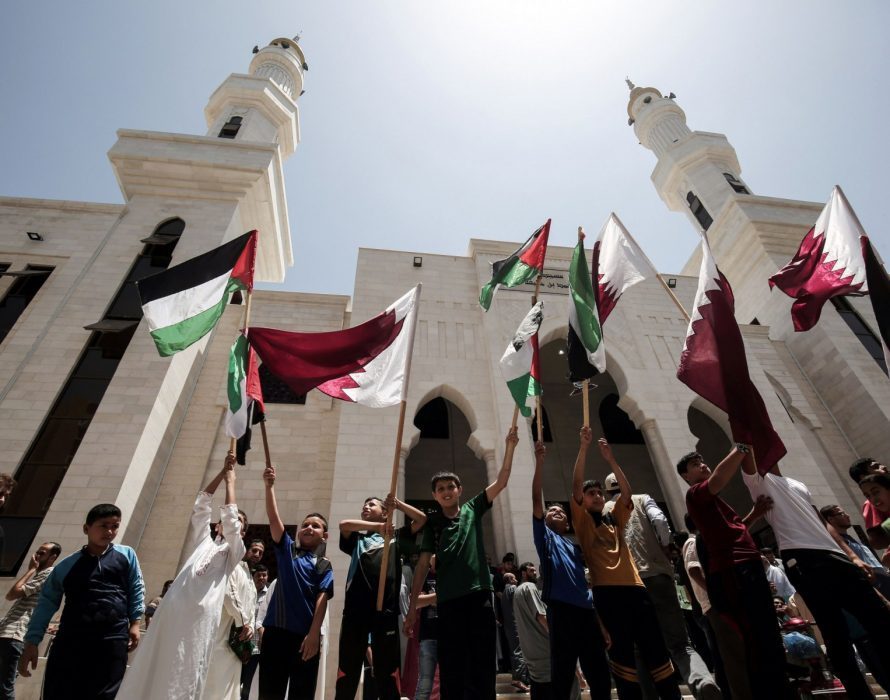One year since Israel’s aggression on the Gaza Strip, Doha News highlights Qatar’s role in mediation efforts since October 7.
Monday marked one year since Israel began its onslaught of the besieged Gaza Strip on October 7, 2023, and rhetoric from figures such as Prime Minister Netanyahu indicate it will continue until their indiscriminate war is “won”.
Satellite imagery from Al Jazeera published a year on from October 7, 2023, reveals how the non-stop bombardment of the enclave has pulverised it to rubble and ruin.
In flouting international law of combat safeguarding against shelling civilian targets, Israeli aggression has destroyed the enclave’s Muslim and Christian houses of worship, educational facilities, hospitals, and homes.
Qatar has consistently stood firm in its commitment to support the Palestinian people in the face of the ongoing Israeli aggression.
“We oppose violence and the targeting of innocent civilians by any party, but a year after this war[…]it is no longer tenable to talk about Israel’s right to defend itself without being complicit in justifying the crime,” Qatar’s Amir Sheikh Tamim bin Hamad Al Thani said during his address at the 79th United Nations General Assembly last month.
Sheikh Tamim further announced Israel’s crimes against the enclave as a “genocide” in breach of human values.
Qatar’s initial reaction
In the immediate aftermath of Hamas launching its operation “Al Aqsa Flood” last year, the Qatari Foreign Ministry issued a statement of “deep concern” and pointed to Israel’s role in inciting the escalating violence.
“The Ministry of Foreign Affairs holds Israel alone responsible for the ongoing escalation due to its ongoing violations of the rights of the Palestinian people, the latest of which is the repeated raids on the blessed Al-Aqsa Mosque under the protection of the Israeli police,” the statement read.
The surprise attack by the Palestinian group combined air and land infiltrations, with rocketfire being launched into southern Israel and members of the movement crossing the land barriers that separate Gaza with Israel.
Human Rights Watch reports that Hamas took 251 Israeli security force personnel and some civilians as captives back to Gaza.
“Qatar brings unique experience and capabilities to mediating the current crisis. Its consistent advocacy for Palestinian rights, trusted ties across the region, and global relationships position Doha well for impactful diplomacy,” Dr. Steven Wright, Associate Professor of International Relations at Hamad Bin Khalifa University, told Doha News in October last year
Qatar-brokered negotiations
Prime Minister Sheikh Mohammed bin Abdulrahman Al Thani, who is also Qatar’s Minister of Foreign Affairs, said that his country firmly believes in the importance of mediation and dialogue “an integral part of our foreign policy”.
Through Qatari-brokered mediation alongside Egypt, five Israeli captives were released by Hamas by the end of October.
In November, Majed bin Mohammed Al Ansari, the official spokesperson for the Qatari Foreign Affairs Ministry, announced that an agreement had successfully been reached for a four-day truce between Hamas and Israel, starting on November 24.
“Every day will include a number of civilians as agreed to total 50 within the four days,” Al Ansari said.
The deal, brokered by Qatar, the U.S. and Egypt, would involve the release of Israeli captive civilians in exchange for Palestinians prisoners held in Israel. It also included a pause in hostilities, with an increase in humanitarian aid entering the Gaza Strip.
The truce was renewed twice and eventually ended on December 1, with 110 Israeli captives released from Gaza in exchange for 240 Palestinian prisoners.
That same day, Qatar expressed “deep regret” over the resumption of hostilities by Israel. The statement added that the immediate resumed bombing of Gaza on December 1 “complicates mediation efforts and exacerbates the humanitarian catastrophe” in the enclave.
Even during the truce, Israel’s army violated the agreement. The United Nations’ humanitarian office reported incidents of Israeli naval shelling near the Gaza shore, as well as military personnel shooting at Palestinians in the enclave, killing at least two people.
Assassination of Ismail Haniyeh
Qatar strongly condemned the July 31 assassination of Ismail Haniyeh, Hamas’ political chief, on Iranian soil. It described the killing as “a heinous crime, a dangerous escalation and a blatant violation of international and humanitarian law”.
“Political assassinations & continued targeting of civilians in Gaza while talks continue leads us to ask, how can mediation succeed when one party assassinates the negotiator on the other side?” Sheikh Mohammed, Qatar’s Prime Minister said at the time.
This wasn’t the first instance this year of targeted strikes against Hamas officials.
In January, a targeted drone strike in southern Beirut killed Saleh Al Arouri, who was the former deputy chief of Hamas’ politburo and key figure in establishing the group’s armed wing.
Both killings follow comments from the leader of Israel’s domestic security agency, Shin Bet, Ronen Bar, who vowed to “eliminate” Hamas figures, wherever they may be.
In Gaza, at least 41,909 people have been killed by Israel and 97,303 have been wounded over the last 12 months.







